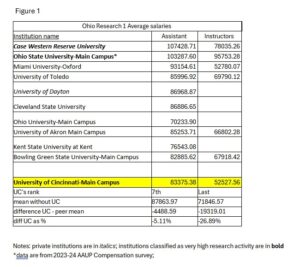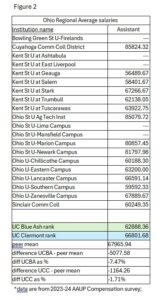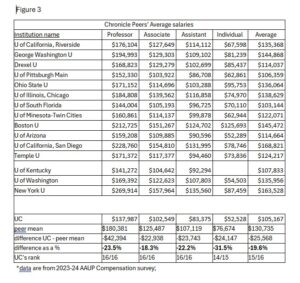- November Election Hotly Contested
- Report from an Eventful Biennial Meeting
- UC Salaries Below the Mean Amongst Peer
November Election Hotly Contested
 The November 5th election was hotly contested at the national, state, and local levels. Across the university, many are dealing with intense emotions in its aftermath. I encourage all of us to be mindful and respectful of our faculty colleagues, students, and other UC employees as each processes the situation in their own way.
The November 5th election was hotly contested at the national, state, and local levels. Across the university, many are dealing with intense emotions in its aftermath. I encourage all of us to be mindful and respectful of our faculty colleagues, students, and other UC employees as each processes the situation in their own way.
I also have to acknowledge the defeat of Issue 1 in the state of Ohio. The issue was endorsed by the Chapter, and I think it would have been a critical step in curtailing gerrymandering. The Issue 1 campaign was endorsed by a broad array of labor and good governance groups, and was chaired by former Ohio Supreme Court Chief Justice Maureen O’Connor, a Republican. Many were confident that it would be successful, but the issue failed by a margin of 53.8% to 46.2%. There will be analysis of the defeat in the future, but it is clear that statewide political environment was a factor.
It was hoped that fairer, less partisan districts would have curbed the attacks on higher education and public section labor unions. The defeat of Issue 1 will likely embolden our opponents. We can expect more bills like Senate Bill 83, which would have regulated the teaching of “controversial” concepts like climate change, greatly reduced subjects that are covered by collective bargaining, including retrenchment, and eroded the protections of tenure. Because of strong advocacy efforts by the Ohio Conference AAUP and our coalition of union allies in Columbus, and thanks to thousands of phone calls and emails that many of you made to legislators, we were able to prevent SB 83 from becoming law. Last week Speaker Jason Stephens confirmed that he will not bring SB 83 to a vote in the House during the current “lame duck” session. While this is good news, we know that the next iteration of the General Assembly will present new challenges.
Speaker Stephens was elected with the help of Democrats, which angered some in the Republican caucus and set up an intraparty leadership contest. Last week, Speaker Stephens withdrew his candidacy. The only candidate remaining in the race was Matt Huffman, the current Senate President who is switching over to the House due to term limits. Huffman has been vocal in his support for SB 83, so we can expect that legislation, or something similar, to come back in the next session.
The future looks difficult, but we have faced difficult times in the past and have persevered. As always, a strong and active Chapter is our best defense. If you are not a member, I encourage you to join today. If you know colleagues who are not members, ask them to join. Let’s stand together to protect the future of public higher education in Ohio.
In solidarity,
Steve Mockabee
Chapter President
Report from an Eventful Biennial Meeting
Ron Jones, Cassie Fetters, Chris Campagna, and Phoebe Reeves, elected delegates
 This June, we all headed to Washington DC as your elected reps for the biannual meeting of the National AAUP. Four years ago, National AAUP chose to move from an annual meeting structure to this biennial format. And two years ago, the delegates of the first biennial meeting chose to approve the affiliation with AFT. These developments, as well as the departure of former Executive Director Julie Schmid, are a lot of change for a large institution to weather even in calm times, let alone in our complex, post-Covid environment.
This June, we all headed to Washington DC as your elected reps for the biannual meeting of the National AAUP. Four years ago, National AAUP chose to move from an annual meeting structure to this biennial format. And two years ago, the delegates of the first biennial meeting chose to approve the affiliation with AFT. These developments, as well as the departure of former Executive Director Julie Schmid, are a lot of change for a large institution to weather even in calm times, let alone in our complex, post-Covid environment.
In preparation for the meeting, which included an election for the positions of President, Vice President, and other council members, we spent a lot of time in small groups, discussing the future of the AAUP at the national level. Most importantly, Irene Mulvey, the president at the time, faced a challenge from Todd Wolfson, president of the Rutgers University AAUP chapter. We met with Mulvey and Wolfson on multiple occasions, via Zoom before the meeting and in-person at the meeting itself. In these interactions we recognized that both candidates had a strong command of the AAUP’s core values and of the current challenges facing Higher Education. That said, Wolfson’s challenge to Mulvey was based on frustrations with her leadership, both from the National staff office and from some prominent chapters throughout the country (like at Rutgers). The general critique was that Mulvey was not an effective administrative leader and also not up to the task of the current cultural and political moment. Wolfson’s frustration with the status quo also came out of a significantly different view of the AAUP’s role in advocating for higher education than past leaders–one more directly connected to its power to organize faculty and other higher ed workers as a collective. We ultimately were convinced by Wolfson’s ideas for the future, even we felt strong concern that in his passion for change he might be advocating for too much too quickly, especially considering the AAUP’s long history as the country’s most deliberative and authoritative voice on American higher education.
After a lot of intense discussion amongst ourselves, with candidates, and with other delegates, we chose to split our votes between slates, in the hopes that this would create a diverse council with a balance of ideas, institutional memory, experiences, and values. In the end, the membership overall voted in Todd and his whole slate, which means that there will be—and has been already—a shift in focus and tone from the leadership. We continue to watch with interest as Todd and his council move forward with their agenda, and we encourage you to contact them with your responses to any changes they have made.
Beyond officer elections, the primary issue of concern at the meeting was the rocky start to the affiliation with AFT. Members expressed that the AAUP is not seeing the rewards of the affiliation that were promised, and some members worried about the apparent lack of communication between AAUP and AFT leadership. Many members were very concerned to find out that the AFT had only paid a small portion of the funding promised in the affiliation agreement, and financial matters were additionally clouded by the delayed presentation of the budget. Members also expressed concerns about staffing issues at the national office, including the many empty positions that were not being filled. Additionally, there was discussion about the delayed replacement of interim Executive Director Nancy Long with a permanent hire. Related to this were concerns about delays in getting responses to questions and worries about adequate staffing levels for essential job functions. More positive reports included the many organizing wins across the country, as well as the presentation of the important work of Committee A on Academic Freedom and Tenure.
AAUP and AFT obviously share several critical goals including the right to organize, recognizing the value of faculty and of education. But the two unions also have very different histories and cultures. The AAUP has historically valued civility, and a respect for process. AFT operates more directly, candidly, and with a certain belief that efficacy and results are more important than process.
One issue that caused a lot of debate, and eventually passed, was a proposed constitutional amendment that would allow for monetary compensation for elected leaders, on par with course-buy out from their home institution. Now-President Todd Wolfson was in favor of this proposal, arguing that it would attract younger leaders as opposed to those in retirement, and that it would encourage our leadership to be more present in Washington, DC and devote more time to their positions. We’ll get to see in the coming years how this works out.
A side project with great rewards for us was that in our attempt to diligently research the elections, and to find out more about the AFT affiliation experience, we reached out to and connected with delegates from a number of other Ohio colleges and universities. Both before the meeting and on the ground in DC, we were heartened to hear from our colleagues across the state about their organizing work, their thoughts on the candidates, and more. We are fortunate to have other strong AAUP Chapters working side by side, and hope to maintain these connections in the future.
Looking forward, we hope that the AFT-AAUP affiliation will continue to protect academic freedom and tenure, while also strengthening ties with unions and organizing new collective bargaining chapters. Significant challenges remain. We will continue to pay close attention, be involved, and report back to the membership regularly.
UC Salaries Below the Mean Amongst Peers
 As we prepare for bargaining, the Budget and Compensation has noticed that many groups of our faculty have salaries lower than the mean among our peer groups. Among our peers in the state of Ohio, salaries for all UC assistant professors and for UC Main Campus instructors has fallen below the mean salary of assistant professors at our peer institutions around the state. In addition, the salaries for all UC Main Campus faculty fall below the average salaries of the self-identified peers listed in the Chronicle.
As we prepare for bargaining, the Budget and Compensation has noticed that many groups of our faculty have salaries lower than the mean among our peer groups. Among our peers in the state of Ohio, salaries for all UC assistant professors and for UC Main Campus instructors has fallen below the mean salary of assistant professors at our peer institutions around the state. In addition, the salaries for all UC Main Campus faculty fall below the average salaries of the self-identified peers listed in the Chronicle.
In Academic Year (AY) 2023-2024, UC Main Campus assistant professors and instructors fell below the mean of all over Research 1 institutions in Ohio. Out of 11 schools, assistant professors at UC Main Campus ranked 7th, and UC Main Campus Instructors ranked last in average salary. Average pay for UC Main Campus assistant professors fell nearly $4500 below the mean of other Ohio Research 1 institutions’ assistant professors, and average pay for UC Main Campus Instructors was more than $19,000 less than their peers at other Ohio Research 1 institutions (See Figure 1).
In addition, assistant professor salaries at the regional campuses have also fallen below their peer institutions around the state. UCBA’s assistant made over $5000 under the average of our peers around the state, and UCC’s assistants made a little over $1100 under our peers (See Figure 2).
Each year, UC provides a list of our peers that is published in the Chronicle of Higher Education. Of the peers identified by UC, we are near the bottom of the list in salaries for all categories. For professors, associates, and assistants we were dead last among our peers for average salaries, and in instructors we were second to last. The average professor salary is more than $42,000 below the mean for our peers, the average associate salary is nearly $23,000 below the mean for our peers, the average assistant salary is over $23,000 below the mean for our peers, and the average instructor salary is over $24,000 below the mean for our peers.



